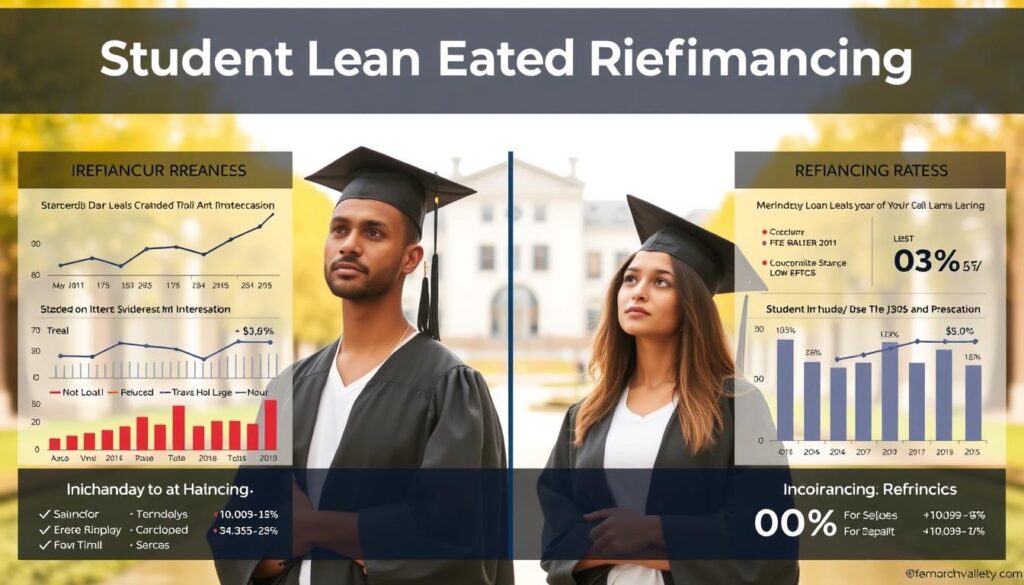Refinance Student Loans and Save – Expert Advice
Did you know refinancing your existing loans can save you thousands? CNBC Select found that borrowers can cut their monthly payments and interest by a lot.
Managing many high-interest loans can feel like a big burden. Refinancing can make your payments easier and might even lower your interest rate. Our expert advice will help you through this process. We aim to guide you towards a better financial future.
Key Takeaways
- Refinancing can lead to significant savings on interest and monthly payments.
- Simplifying your payments can reduce financial stress.
- Expert advice is available to help navigate the refinancing process.
- Lowering your interest rate can save you thousands over the life of your loan.
- Refinancing can help you achieve your long-term financial goals.
What is Student Loan Refinancing?
Student loan refinancing is a way to replace old loans with a new one. This new loan might have better terms. It helps borrowers combine several loans into one, making it easier to manage their finances.
Bankrate says refinancing student loans means swapping old loans for a new private loan. This new loan might have a lower interest rate and different repayment terms. It’s great for those wanting to simplify their payments and lighten their financial load.
Definition of Student Loan Refinancing
Refinancing student loans is like student loan consolidation. Borrowers get a new loan from a private lender to clear their old loans. This new loan often has better terms, like a lower interest rate or different repayment periods.
Benefits of Refinancing
Refinancing student loans has many perks, like lower interest rates and easier payments. It simplifies managing debt by combining loans into one. Plus, a lower interest rate can save a lot of money over time.
| Benefits | Description |
|---|---|
| Lower Interest Rates | Potentially reduce the amount of interest paid over the life of the loan. |
| Simplified Payments | Consolidate multiple loans into a single loan with one monthly payment. |
| Better Loan Terms | Negotiate more favorable repayment terms, such as a longer or shorter repayment period. |
Understanding student loan refinancing can help borrowers make smart financial choices. It can lead to lower monthly payments or save on interest. Refinancing is a useful tool for managing student loan debt.
Key Reasons to Refinance Student Loans
Refinancing student loans often aims for lower interest rates and easier payments. It can save thousands and make managing money simpler.
Lower Interest Rates
Securing a lower interest rate is a big reason to refinance. CNBC Select says good credit can lead to much lower rates on private student loans. This means big savings over time.
For example, switching a $30,000 loan from 6% to 4% interest can save over $3,000 in 10 years. The best refinance options go to those with good credit and steady income.
Simplifying Payments
Refinancing also makes payments easier. It combines multiple loans into one, simplifying finances. This reduces the chance of missed payments and financial stress.
Having one payment can also boost your credit score. On-time payments are key to a good credit score.
Accessing Better Loan Terms
Refinancing can also lead to better loan terms. You might switch from a variable to a fixed rate, or the other way around. It also lets you change co-signers if your financial situation has changed.
| Refinancing Benefit | Description | Potential Savings/Impact |
|---|---|---|
| Lower Interest Rates | Secure a lower interest rate on your loan | Save thousands in interest over the loan’s lifetime |
| Simplifying Payments | Consolidate multiple loans into one | Reduce financial stress and avoid missed payments |
| Better Loan Terms | Switch between fixed and variable rates, adjust co-signer status | Align loan terms with current financial situation |
Understanding why to refinance student loans helps make smart financial choices. It can lower interest rates, simplify payments, and improve loan terms. These benefits can save a lot of money and reduce stress.
When is the Right Time to Refinance?
Figuring out when to refinance your student loans is key to managing your money well. Refinancing at the right time can lead to better interest rates, easier payments, and big savings.
Sallie Mae says to refinance when your credit score is good, you have a steady job, and your debt isn’t too high. These things affect how much you can save and the rates you get.
Considerations for Timing
When thinking about refinancing, several things matter. Your credit score is very important because a higher score means lower rates. Also, having a stable income and not too much debt shows you can pay back the loan.
Your job history and financial health also count. A steady job and not too much debt help you get better refinancing deals.
Signs You Should Refinance Now
If your financial situation has gotten better, it might be time to refinance. For example, if your credit score has gone up a lot, you might get lower rates now.
- A stable or increased income
- A lower debt-to-income ratio
- Improved credit score
Refinancing is also good if interest rates have fallen since you got your loans. By refinancing, you can lock in a lower rate. This can lower your monthly payments or the total amount you pay over time.
Deciding to refinance should be based on a careful look at your finances and goals. By thinking about these points, you can make a smart choice about refinancing your student loans.
How to Check Your Credit Score Before Refinancing
Before you refinance your student loans, knowing your credit score is key. It affects the interest rate you can get. Bankrate says checking your score is crucial for better loan terms.
Your credit score is a three-digit number that shows lenders how reliable you are. It’s based on how you’ve paid bills, how much credit you use, and how long you’ve had credit. A higher score means you’re seen as more trustworthy by lenders.
Importance of Credit Score
A good credit score is vital for student loan refinancing. It not only changes the interest rate but also the lender’s decision to approve you. Lenders see high scores as less risky, offering better terms.
Here are some key reasons why your credit score matters:
- A higher credit score can lead to lower interest rates.
- Borrowers with good credit scores are more likely to be approved for refinancing.
- A good credit score can provide more flexible repayment terms.
Steps to Improve Your Score
If your credit score isn’t great, you can work on it. It takes time, but it’s worth it for better refinancing terms.
Here are some strategies to enhance your credit score:
- Make on-time payments: Payment history accounts for a significant portion of your credit score.
- Reduce debt: Lowering your credit utilization ratio can positively impact your credit score.
- Monitor your credit report: Check for errors or inaccuracies that could be affecting your score.
- Avoid new credit inquiries: Applying for too much credit in a short period can negatively impact your score.
Knowing about student loan repayment options helps you make smart refinancing choices. Your credit score is key to these options, whether it’s income-driven plans or standard terms.
| Credit Score Range | Interest Rate | Loan Terms |
|---|---|---|
| 750-850 | Lower interest rates | Favorable loan terms |
| 700-749 | Competitive interest rates | Standard loan terms |
| 650-699 | Higher interest rates | Less favorable loan terms |
Understanding your credit score and improving it can lead to better refinancing options. This means more manageable payments and savings over time.
Understanding the Refinancing Process
Exploring the refinancing process is key. It’s important to know what you need to qualify and what documents are required. Refinancing can help you get lower interest rates and make payments easier. It can also save you money in the long run.
Eligibility Requirements
To qualify for refinancing, lenders look at a few things. Sallie Mae says they check your credit score, income, and how much debt you have compared to your income. A high credit score is crucial because it affects the interest rate you get and if you qualify.
- A credit score of 650 or higher is generally considered good for refinancing purposes.
- Lenders also look at your income stability and debt-to-income ratio to assess your ability to repay the loan.
Having a steady income and a low debt-to-income ratio can help you get better loan terms.
Documentation Needed
When you apply for refinancing, you’ll need to provide some documents. These usually include:
- Proof of income (pay stubs, W-2 forms)
- Identification (driver’s license, passport)
- Proof of enrollment (for students)
- Current loan statements
The exact documents needed might vary by lender. It’s a good idea to check with them directly.
Refinancing can seem complex, but knowing what you need can make it easier. Financial experts say,
“Refinancing student loans can be a savvy financial move for those with good credit and a stable income.”
| Lender | Credit Score Requirement | Income Requirement | Debt-to-Income Ratio |
|---|---|---|---|
| Lender A | 650+ | Stable income, proof required | < 40% |
| Lender B | 680+ | Minimum $35,000/year | < 35% |
| Lender C | 700+ | Stable income, proof required | < 30% |
By understanding the refinancing process, including what you need to qualify and the documents required, you can make smart choices about your federal student loans. This can help you get lower interest rates.
Comparing Lenders for Student Loan Refinancing
When looking to refinance student loans, comparing lenders is key. There are many lenders with different terms. It’s important to look at a few key factors to get the best deal.
Key Factors to Consider
According to CNBC Select, look at interest rates, fees, and repayment terms. Interest rates affect how much you’ll pay over time. Fees can increase the cost. Repayment terms, like loan length and payment flexibility, also matter a lot.
Don’t forget to check the lender’s customer service and reputation. Good service and a solid reputation can improve your experience.

Questions to Ask Lenders
Prepare questions for lenders to make a smart choice. Ask about eligibility requirements, repayment options, and fees. These questions help you understand what they offer.
Also, ask about their customer complaints handling and deferment or forbearance options. This way, you can see if they fit your needs.
For more info on refinancing student loans, check out Credible’s student loan refinance page. It offers insights and helps you through the process.
The Impact of Federal vs. Private Loans
It’s important to know the difference between federal and private student loans when thinking about refinancing. The type of loan you have affects your refinancing choices and results.
Refinancing Options for Different Loans
Federal student loans are backed by the government and often have benefits like income-driven repayment plans and loan forgiveness. Private loans, offered by banks and other lenders, have different refinancing options.
Refinancing federal student loans might mean losing benefits like loan forgiveness and income-driven repayment plans. On the other hand, private student loans don’t have these benefits to start with. So, refinancing them might not lead to the same losses.
| Loan Type | Refinancing Options | Potential Benefits | Potential Drawbacks |
|---|---|---|---|
| Federal Student Loans | Refinance with private lenders | Lower interest rates, simplified payments | Loss of federal benefits, such as loan forgiveness |
| Private Student Loans | Refinance with other private lenders | Potential for lower interest rates, better terms | May not qualify if credit score is poor |
Pros and Cons of Refinancing Each Type
Refinancing federal student loans can help with lower interest rates or simpler payments. But, it’s important to think about losing federal loan benefits. For private student loans, refinancing might offer better terms or rates, depending on your credit score and financial situation.
Bankrate says federal student loans have more flexible repayment options and forgiveness programs than private loans. This is key when deciding to refinance.
In summary, knowing the effects of refinancing federal versus private student loans is crucial. Borrowers should think carefully about their loan types and the pros and cons of refinancing.
Frequently Asked Questions About Refinancing
Refinancing student loans raises many questions. It’s important to clear up these doubts to help borrowers make smart choices. Let’s explore the world of student loan refinancing and tackle common concerns and myths.

Common Concerns
Many people worry about refinancing their student loans. Sallie Mae says worries include losing federal benefits and getting a lower interest rate. Refinancing federal loans to private loans can mean losing benefits like income-driven repayment plans and Public Service Loan Forgiveness (PSLF).
But, refinancing can also offer benefits like a lower interest rate or simpler payments. To better your chances of getting a lower rate, check your credit score and history before applying.
Myths About Student Loan Refinancing
There are many myths about student loan refinancing. One is that only those with high incomes or excellent credit can refinance. But, many lenders have flexible criteria, and some help borrowers with less-than-perfect credit.
Another myth is that refinancing is a long and hard process. While it does require some paperwork, many lenders have made their processes easier and quicker. This makes it simpler for borrowers to refinance their loans.
By knowing the truth and debunking these myths, borrowers can make better choices about refinancing their student loans.
Tips for Getting the Best Refinancing Rates
Getting the best refinancing rates for your student loans can change your financial future. It’s key to know how to negotiate rates and use tools and resources.
Strategies for Negotiating Rates
To get a lower interest rate, you need to be prepared and do your research. Bankrate says comparing offers from different lenders can help you get a better rate. This way, you can find the best rates out there.
To negotiate well, you should:
- Check your credit score and history for errors that could hurt your rate.
- Get offers from several lenders to use as bargaining tools.
- Be ready to talk about your financial situation and how the loan fits into your plans.
Utilizing Tools and Resources
Using the right tools and resources can also help you get the best rates. Student loan refinance calculators can show you how different rates and terms affect your payments and savings.
Some important resources include:
- Student Loan Refinance Calculators: These tools let you compare offers and see how different rates and terms affect your payments and savings.
- Financial Advisor Services: Getting professional advice can be very helpful in finding the best refinancing options for you.
- Online Comparison Platforms: Websites that compare lender offers can make it easier to find the best rates.
By using good negotiation strategies and the right tools, you can make the most of refinancing your student loans. This way, you can get lower interest rates.
Here’s an example of how refinancing at different rates can save you money:
| Loan Amount | Original Interest Rate | Refinanced Interest Rate | Monthly Savings | Total Savings Over 5 Years |
|---|---|---|---|---|
| $30,000 | 6.0% | 4.5% | $50 | $3,000 |
| $50,000 | 7.0% | 5.0% | $100 | $6,000 |
This example shows how refinancing to a lower rate can save you a lot of money over time.
Real-Life Success Stories of Student Loan Refinancing
Refinancing private student loans can save you a lot of money. CNBC Select found that borrowers save thousands by refinancing to lower rates. This makes managing your finances easier.
Achieving Significant Savings
A borrower refinanced their loans and cut their monthly payments a lot. They found a lender with a great refinance option. This lowered their interest rate and saved them a lot over time.
Personal Experiences with Refinancing
Many people have had good experiences with refinancing their loans. They looked for the best refinance options and found them. This made their payments simpler and saved them a lot of money. Their stories show how refinancing can help with private student loans.









